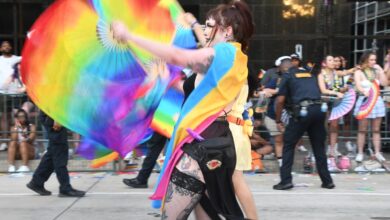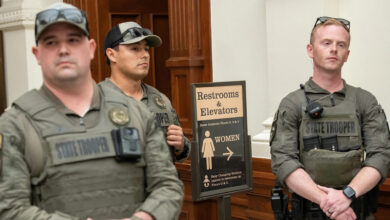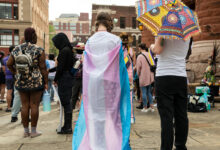Leather, Lace and Legacy: Montrose Center Gala Honors Community Leaders
Out for Good Gala raises funds to sustain essential LGBTQ services in Houston.
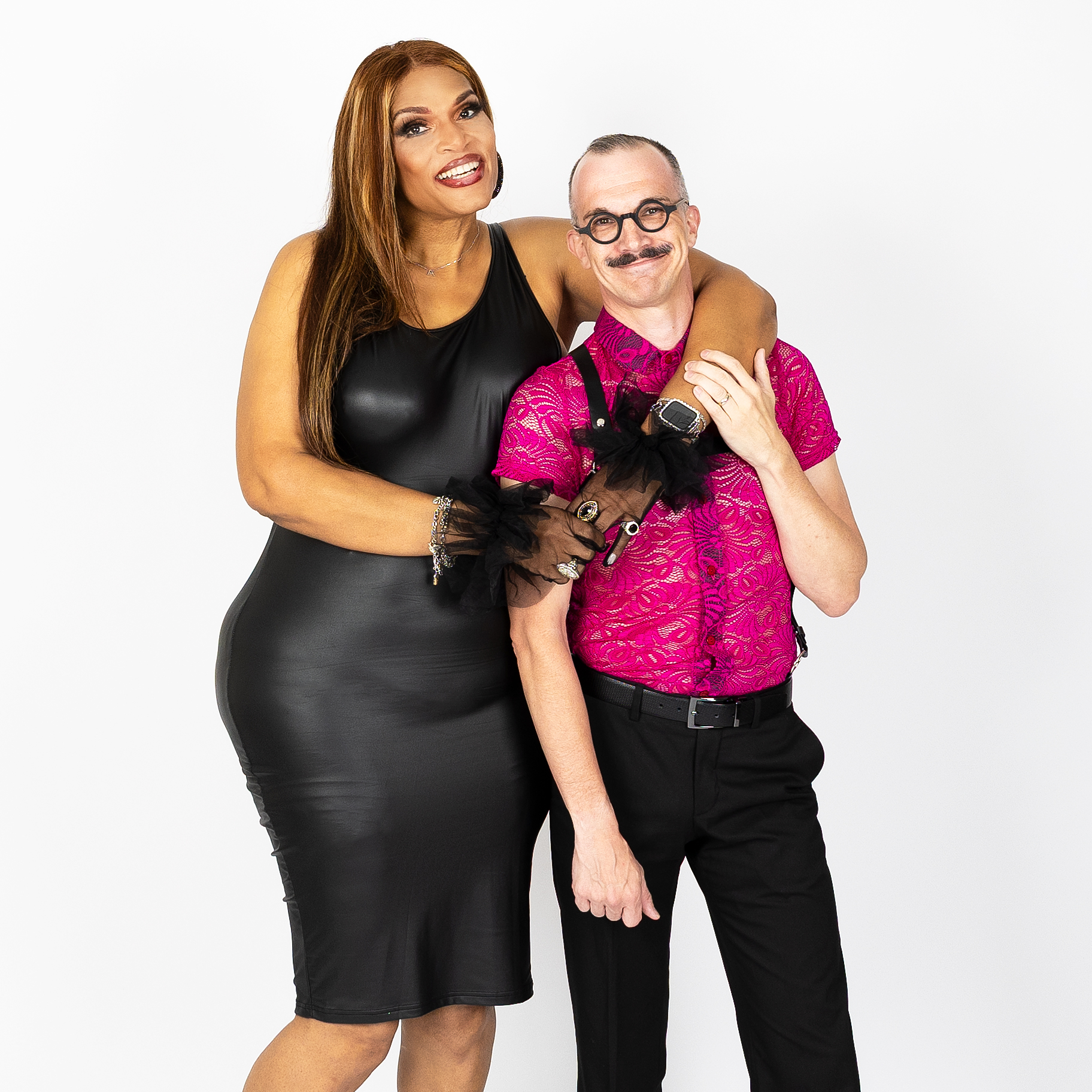
“We are Houston’s LGBTQ+ Center. We have been serving this community since 1978, and our services are vast,” says Meleah Jones, Montrose Center’s director of development. “We do mental-health services, we have gender-affirming care, we provide youth services, senior services, 24-hour crisis intervention, and much more. We like to say we’re like a one-stop shop for LGBTQ+ Houston for their social-services needs.”
The annual Out for Good gala is the Center’s largest fundraiser. “It benefits all of our programs. It helps us fuel our mission year round,” Jones explains. “Last year, we raised over $400,000 at the gala, and we’re hoping to have over 800 attendees this year.”
The event, timed to coincide with National Coming Out Day, is all about celebrating successes and raising awareness about the Center’s mission. “It’s like a traditional gala that you might think of, but with some extra fun elements,” she explains. “This year, for example, we are incorporating a leather-and-lace theme. I’m sure we’re going to see lots of harnesses and see-through tops. We want to celebrate our community and be out and proud even in our current time.”
What: Montrose Center’s Out for Good Gala
When: Saturday, October 4
Where: Marriott Marquis Houston, 1777 Walker St.
Info: onecau.se/outforgood2025
Make a Difference as a Volunteer Donor
The Montrose Center’s signature gala returns, uniting Houston’s LGBTQ community in celebration and support. Proceeds sustain essential services—from mental health care and gender-affirming programs to HIV prevention and 24-hour crisis intervention. Whether you attend, volunteer, or donate, your participation ensures these vital resources continue to thrive. Learn more at onecau.se/outforgood2025 or contact development@montrosecenter.org to sign up.
Building Wholeness, Fighting for Humanity
Honoree Atlantis Narcisse

When Atlantis Narcisse learned she would be honored at the Montrose Center’s Out for Good gala next month, she was stunned. “I think I’m still in disbelief, if that makes sense,” Narcisse admits. “I have never thought about my work or anything I have done for the community as something that needed to be acknowledged. I was always just doing it for the community.”
“I am introverted,” she adds, “so this is like, ‘Oh my God!’ But I’m sure it will sink in.”
This year’s gala theme, Leather & Lace, reflects both toughness and transparency—qualities Narcisse knows intimately. “Leather and lace reminds me of the durability and the tenacity that I have had in order to keep going, while still allowing some parts of me to be transparent, visible, but still reclusive. In a sense, that allows me to maintain some type of autonomy and agency for myself.”
Narcisse is the founder and executive director of Save Our Sisters United (SOSU), a Black trans–led organization that grew from conversations she began while working as an entertainer in Houston. “Early on, nobody was thinking about what it was like to be Black, trans, and to be able to have access to affirming things,” she recalls. “The SOSU was really this call to share our shame, see our strength, and save our sisters united in the force. With that in mind, I started this conversation with trans and cis women about what it means to be a woman, because I knew the original part of the fight was cis-versus-trans.”
Those dialogues evolved into a movement. “We acknowledged the things that held us apart and the stereotypes we heard about ourselves. We saw that we shared them—just in different orders—and that the things really causing the problem were the men we were dating and society,” she explains. “After that, SOSU became an area to allow women and people of trans experiences to exist, and to welcome others in to work with us.”
Yet, challenges remain. “We are still struggling with the performative ‘taking care of trans people’ instead of really taking care of trans people through hearing them and seeing them,” she adds. “We should not be a second thought. We are the mothers and forepeople of the movement. So how are we a second thought?”
SOSU tackles these issues through direct aid and organizing. “We have helped people pay rent,” she shares. “But the real thing is organizing, mobilizing, and removing the siloed notion that we just exist on Trans Island. I think it’s time that we transition a little from self-care to include community care.”
Narcisse also points to a deeper problem with how society defines trans people. “We are the only demographic of people where a medical term has become our intro into every room,” she says. “If we would say, ‘There goes suicidal Betty or bipolar Helen,’ everyone would be offended. But no one is offended that ‘trans’ was meant for my medical records.”
The Montrose Center has been a vital partner in SOSU’s work. “They have always given us free rental space. They have collaborated with us,” Narcisse explains. “We have to flip the ‘me agenda’ back to the ‘we agenda.’ If you’re not taken care of, then I’m not taken care of.”
Reflecting on her own journey, Narcisse urges the community to consider the long-term well-being of trans leaders. “What does it look like for me to age in the system? Where is my 401(k)?” she asks. “We must create space for elders to sit and smell the flowers, as well as watch the grass grow.”
When asked what she hopes people take away from her story, Narcisse is clear: “I am a human being who happens to be trans and has given so much of myself to the community. And all I am asking the community to do is stand up so that no one person would have to sacrifice this much and not enjoy life.”
Despite the obstacles, she draws hope from the next generation. “What lights me up is just seeing the newer queer and gender-expansive community walking through and being themselves. It gives me the optimistic thought that this is going to get better.”
Showing Up, Speaking Out, and Fighting for Texas
Brad Pritchett
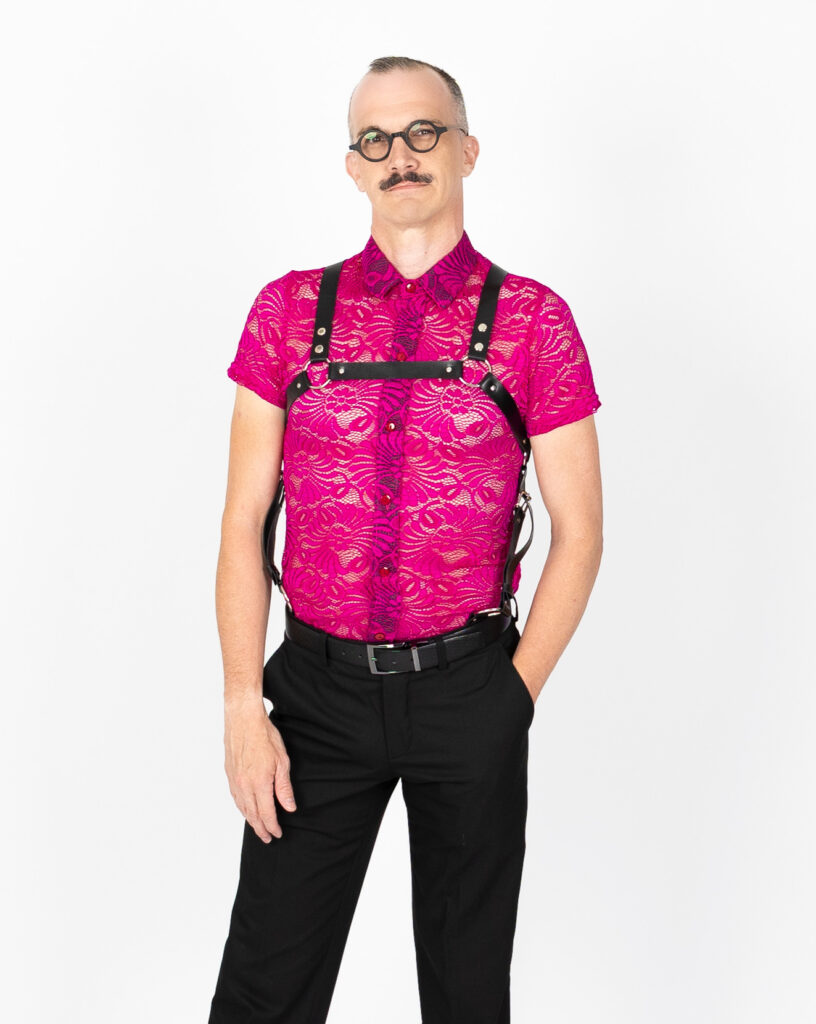
When Brad Pritchett learned he would be honored at the Montrose Center’s gala, his reaction was simple. “You should probably be picking somebody else,” he said. “I’m generally hesitant to accept any type of recognition.”
This year’s gala theme, Leather & Lace, highlights resilience and visibility—things that Pritchett has experienced firsthand. “I’ve gotten more information about the activism that exists within the leather community,” he explains. “I started getting outreach from folks really involved in the leather community who want to use their positions to start doing activism and advocacy.”
Pritchett’s own journey into LGBTQ advocacy began by simply showing up. “I was one of those folks who just started showing up to everything. I knew I wanted to be more involved, so I became a member of the Houston LGBTQ+ Political Caucus,” he shares. “There, people would ask, ‘Does anybody know how to do this?’ I would say, ‘I do.’ Sometimes I was telling the truth, and other times I thought, ‘I’ll figure it out.’ That was the start of it for me, and then it transitioned into a career.”
That career has now placed Pritchett at the heart of some of Texas’ fiercest political battles as the interim CEO at Equality Texas. One pivotal moment came when the State targeted families of transgender children.
“When the Department of Family and Protective Services decided they were going to allow the governor and attorney general to investigate the families of trans kids, we had parents doing what you would want them to do, which is supporting their kids and listening to doctors,” he recalls. “Then, you had the State weaponizing an agency against them for no reason. We were getting these reports from families about CPS investigators pulling their kids out of class and grilling them about who they were and how their parents were accepting them. It wasn’t just the kids who were trans, either. It was their siblings, as well.”
The impact was devastating. “We literally started seeing families becoming political refugees, where they had no choice but to leave the state to protect themselves and their kids,” Pritchett says. “But just because somebody relocates, that doesn’t mean they’re not still a Texan.”
Pritchett also credits the Montrose Center as a vital ally in this work. “Montrose Center is one of those places that I will always brag about if given the opportunity,” he says. “It’s their therapist support, support for young people and seniors, food pantries, health care, and more. If you’re in need of something, the odds are good you’ll find it at the Montrose Center. It’s a crucial resource for us as a statewide organization.”
Asked about today’s biggest challenge, Pritchett doesn’t hesitate. “Right now, it is this proliferation of misinformation, specifically against the trans community,” he explains. “The State decided it was okay to weaponize the government to target families, and they’re expanding that to limit the ability of trans people to exist in public spaces.”
To win these battles, Pritchett says, “We have to be even louder than them and continue, at every opportunity we get, to confront the lies that they’re spreading.”
As for what keeps him going, he says, “I think about the community members that we get to work with. I’ve watched kids show up to give testimony who are now adults and still showing up to give testimony.”
“Stubbornness really runs in my family, so I don’t think I give up easily,” he adds. “I’ve lived in Texas my entire life. I think we all deserve to live in a place that lives up to its full potential. No matter how bad it gets, at some point that pendulum is going to swing the other direction, and we’re the ones responsible for giving it the momentum to actually make it that way.”
For Pritchett, this Montrose Center honor is an opportunity to send a message. “It lets people know that no matter where you start in politics or in LGBTQ+ advocacy, there’s a path forward for everybody,” he notes. “I hope it lets people understand that if you want to get involved, there’s a way to do it. You just have to figure out what makes sense for you.”




